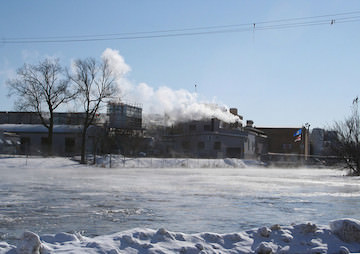Tyson Gets Its Hand Slapped for Cheating Workers—Again
The Supreme Court handed a victory to slaughterhouse employees seeking to recover overtime wages, but the suit was just one in a string of cases against the food giant with a penchant for flouting fair labor laws. A Tyson Foods plant in Jefferson, Wis. (Flickr)
A Tyson Foods plant in Jefferson, Wis. (Flickr)
By Carl J. Mayer
Jurgis Rudkus, the protagonist of Upton Sinclair’s watershed 1906 novel about cruelty and oppression in Chicago’s stockyards, gradually has an epiphany that the life he has made for his family is not all it seems.
“And so on Christmas Eve Jurgis worked till nearly one o’clock in the morning, and on Christmas Day he was on the killing bed at seven o’clock,” wrote Sinclair in “The Jungle.” “All this was bad, and yet it was not the worst. For after all the hard work a man did, he was paid for only part of it. Jurgis had once been among those that scoffed at the idea of these huge concerns cheating; and so now he could appreciate the bitter irony of the fact that it was precisely their size which enabled them to do it with impunity.”
Astoundingly, only days ago, the Supreme Court issued an opinion on a case straight out of Sinclair’s era: Workers sued a large conglomerate for cheating them on their wages. The court’s decision in Bouaphakeo v. Tyson, upholding a verdict in favor of pork slaughterhouse workers suing to recover overtime wages was rightly hailed as a significant victory for employee class actions.
But the case also shows how much more needs to be done to defend the rule of law and protect American workers. Sinclair clinically documented the methods employers used to cheat employees out of their wages—like docking them an hour’s pay for being one minute late or denying them an hour’s pay for working only 55 minutes—but many Americans remain unaware that similar practices continue today.
The Tyson lawsuit was brought in 2007 by more than 3,000 workers at Tyson’s Storm Lake, Iowa, plant who claimed that the company unlawfully bilked them out of overtime wages. A jury agreed, awarding them almost $6 million and finding that Tyson refused to pay its employees for the time they took to put on and take off safety equipment.
Tyson Foods Inc.—one of the 100 largest companies in the United States, with $33 billion in annual sales—has been flouting the law for years by refusing to properly track and pay for workers’ time.
The Tyson employees brought their case under the Fair Labor Standards Act (FLSA), passed in 1938. At the time, President Franklin Roosevelt called the law the most important piece of New Deal legislation since Social Security. Among other things, it outlawed child labor, set a minimum wage, mandated payment of overtime wages and required employers to properly track and record employee time. In short, this is the type of enlightened legislation protecting ordinary Americans (rather than corporate lobbyists) that is virtually never passed in our current political system.
For almost three decades, however, Tyson has refused to comply with the most rudimentary requirements of the FLSA. In 2008, a federal judge in Tennessee (upholding one of more than a dozen wage-theft litigations brought against Tyson over the years) wrote about the company’s “deeply entrenched resistance to changing their compensation practices to comply with [the Fair Labor Standards Act’s] requirements.”
All the way back in 1988, the Department of Labor had found that Tyson’s predecessor corporation, Iowa Beef Processers, had violated the FLSA’s record-keeping and overtime provisions. By 1996, a federal judge in Kansas issued an injunction requiring Tyson to obey the law and account for workers’ hours.
Despite this, Tyson continued—and continues to this day—to violate provisions of the FLSA (as interpreted by the Department of Labor and several federal judges) that require the company to track the actual hours worked. Instead, Tyson hired an expert to do a time study and estimated that workers were spending only four minutes a day putting on and taking off safety gear. But when the workers’ lawyers hired their own statistical expert, results showed that the actual time spent was much longer. Tyson cried foul and appealed all the way to the Supreme Court, claiming class actions can’t use statistical evidence. Tyson’s hypocritical position was undoubtedly a reason the Supreme Court handed a victory to workers.
Tyson knows that justice delayed is justice denied and that it saves money by not compensating employees. There is always an unlimited supply of $1,000 per hour corporate lawyers ready to squeeze Tyson workers, who labor on fast-moving production lines in a physically exhausting and dangerous environment that “requires wielding industrial slaughtering and butchering machinery in a high pressure setting,” as the workers’ lawyers wrote in their brief to the Supreme Court.
Tyson’s line employees at slaughterhouses barely get by on wages as low as $9 or $10 per hour. Some Tyson employees with four-person families are taking home less than $24,000 per year, an amount below the poverty line as defined by the United States Census.
Tyson’s disregard for the law goes back decades and encompasses much more than labor violations. During the Clinton administration, Tyson was charged with bribing Agriculture Secretary Mike Espy with gifts to influence legislation. Espy resigned, and Tyson paid $6 million to settle the accusations. Two convicted Tyson executives faced prison time, but President Clinton pardoned them.
In 2003, Tyson pleaded guilty to violating the Clean Water Act with pollution from its Missouri facility and paid a $7.5 million fine. Before its probation ended, Tyson was charged by the state of Oklahoma with polluting the Illinois River watershed.
Over the years, Tyson has had to settle charges of illegally hiring child labor and discriminating against minorities and women. In 2008, the Department of Agriculture and a federal judge shut down a Tyson ad campaign touting antibiotic-free meat, meat that was in fact laced with antibiotics. And in 2011, Tyson paid a $5.2 million fine to settle charges of bribing health inspectors at its Mexico plant.
Ultimately, the buck stops with Tyson CEO Donnie Smith. In a hagiographic November 11, 2014, profile in Fortune, Smith said, “There are a lot of great biblical principles that are fundamental to operating a good business. Being fair and telling the truth are biblical principles.” Asked whether he thinks a Fortune 500 CEO can get into heaven, Smith responded, “This one will, because I did what the Bible said I had to do to get into heaven. Feeding people is a laudable purpose in life.”
Over a century ago, in “The Jungle,” Sinclair wrote that when management forced workers to work overtime without pay at the slaughterhouse, they would tell the laborers they were “working for the church.” One hopes that Smith will have an epiphany and change his company’s practices.
Smith’s compensation package is roughly $12.5 million per year. For about half of that, he could repay his employees who have sued for stolen wages. The law is not often asked to reflect on religious precepts, but this would seem the proper thing to do.
The time for false pieties by those running Americas largest institutions is at an end. Rarely in American history has the citizenry been more alienated from its business and political leaders, or more distrustful of them.
Tyson serves as an example of why the population believes our system of justice has broken down. While individuals do real time for minor offenses, companies like Tyson can literally thwart the law for decades with few consequences other than relatively modest fines. The FLSA, for example, provides for criminal penalties and jail time. Neither party has even hinted at criminal penalties for Tyson’s ongoing wage theft.
As to our “leaders” in Washington who dismiss this year’s voters as “angry,” it is perfectly possible that citizens’ righteous indignation will persist until our elected officials protect America’s workers, rather than Tyson Foods.
Carl J. Mayer runs the Mayer Law Group, a class-action firm practicing in New York, New Jersey and Virginia. He can be reached at carlmayer.com.
Your support matters…Independent journalism is under threat and overshadowed by heavily funded mainstream media.
You can help level the playing field. Become a member.
Your tax-deductible contribution keeps us digging beneath the headlines to give you thought-provoking, investigative reporting and analysis that unearths what's really happening- without compromise.
Give today to support our courageous, independent journalists.





You need to be a supporter to comment.
There are currently no responses to this article.
Be the first to respond.